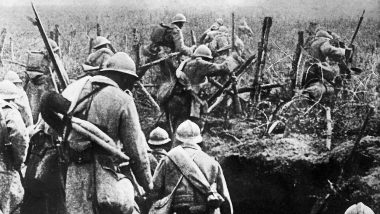Mumbai, August 5: World War I, triggered by the assassination of Archduke Franz Ferdinand, was a global conflict that involved major world powers and left a lasting impact on the 20th century. It occurred primarily in Europe, the Middle East, parts of Africa, and the Asia-Pacific. The war lasted for four years, from 1914 to 1918. The war was one of history's deadliest, causing around 9 million military deaths, 23 million injuries, and up to 8 million civilian deaths, including those from genocide.
The First World War had profound significance for the 20th century. World War I reshaped the world by ending empires, redrawing borders, and causing economic upheaval. It led to significant social changes, technological innovations in warfare, and the creation of the League of Nations. The war's impact profoundly influenced global politics, economics, and culture. World War 3 Fears: NATO Launches 'Nordic Response 2024', a Massive War Game Near Russia Days After Vladimir Putin's Accusation.
When Did World War I Start?
World War I began on July 28, 1914. A chain reaction of diplomatic crises was triggered on this day as Archduke Franz Ferdinand of Austria-Hungary was assassinated in Sarajevo by Gavrilo Princip, a Bosnian Serb nationalist. This country in central Europe blamed Serbia directly for the assassination and demanded strict measures. Though Serbia accepted it, it wasn't sufficient for Austria-Hungary, and they declared war on July 28, 1914. Indian World War I Fighter Pilot's Moving Story Emerges in UK's Commonwealth War Graves Commission.
This declaration of war led to the formation of alliances. Russia, allied with Serbia, began mobilising against Austria-Hungary. Germany, allied with Austria-Hungary, declared war on Russia on August 1, 1914. Germany then declared war on Russia's ally, France, on August 3.
When Did World War I End?
World War I ended on November 11, 1918, when an armistice was signed between the Allied powers and Germany. However, a formal peace treaty, the Treaty of Versailles, was signed on June 28, 1919. World War I ended because the Central Powers—Germany, Austria-Hungary, and their allies—were worn out from continuous fighting, struggling economically, and facing internal problems. The Allies, including Britain, France, and the U.S., used blockades to cut off supplies, launched successful military attacks, and pressured the Central Powers.
These pressures led to the signing of armistices and agreements to stop fighting. The official end came with the Treaty of Versailles, signed on June 28, 1919. This treaty formally ended the war, set terms for peace, and redrew national boundaries, shaping the post-war world order.
(The above story first appeared on LatestLY on Aug 05, 2024 06:19 PM IST. For more news and updates on politics, world, sports, entertainment and lifestyle, log on to our website latestly.com).













 Quickly
Quickly












